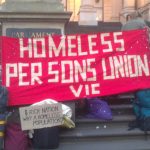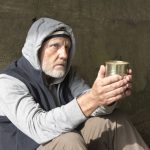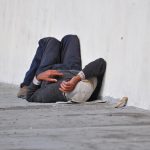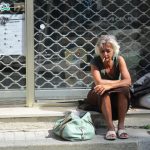The Netherlands is Helping the Homeless, While We’re Criminalising Them
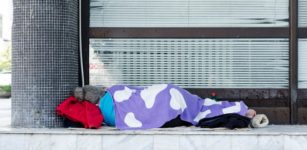
As in many developed countries, it’s becoming increasing rare for people in the Netherlands to carry cash, as electronic payment technologies are embraced for a wide variety of transactions. However, a section of society that’s being left behind by these advances is the homeless.
To counter this, a new jacket is being trialled in the cities of Amsterdam and Rotterdam that’s equipped with an electronic terminal enabling passers-by to make donations of one euro by simply tapping their contactless card.
Making it easier to donate to the homeless
Known as the Helping Heart jacket, the item has been developed by a media company called N=5. It’s a winter coat made of heavy material, with thick lining. The electronic patch is on the front of the jacket, and people can tap their card up to three times a day.
N=5’s managing director Ole Christern says the idea came after he realised that homeless people were suffering because the general public were carrying around less change.
The money donated can be redeemed at official homelessness shelters, where it can be spent on a place to sleep, a shower or food. The developers hope users will be ultimately be able to choose to spend the money on vocational training courses, or to build up savings.
Melbourne is set to make sleeping rough illegal
Meanwhile in Victoria, the City of Melbourne is trying to make it harder for people to sleep rough.
There’s been a 74 percent increase in the number of homeless people in the city over the last two years alone.
Earlier this month, the council voted five to four in favour of amending council bylaws to give police more power to move and fine people who are sleeping on the streets, in parks and other public places.
Currently under the Activities Local Law 2009, a person must not camp in the city “in a vehicle, tent, caravan or any type of temporary or provisional form of accommodation.” The proposed amendments would remove these definitions and simply state that a person can’t sleep in a public place at all.
Turning the homeless into criminals
Spike Chiappalone, a spokesperson for the Homeless Persons Union, told Sydney Criminal Lawyers® that the new camping definition will mean that a person “who is lying down on a blanket or a sleeping bag” will now be breaking the law. So authorities will be able to move them on, as well as fine them.
“These people that are sleeping rough obviously have difficulty with money,” Chiappalone explained, adding they’ll have trouble paying any fines, have more run-ins with police and ultimately be pushed “into the criminal justice system.”
The long-time homeless rights advocate pointed out that the City of Melbourne’s proposed amendments entail two other harsh measures.
Firstly, the bylaws are to be changed to make it easier for authorities to confiscate unattended property. Items that are seized and impounded will only be returned if their owners are able to pay a fine.
As Spike points out, this will further compound the difficulties of those being forced to sleep on the street.
“These people will lose everything that they have,” Mr Chiappalone outlined. He went onto explain that homeless people will be “forced to walk around with everything they own,” even if they want to use a shower, or need to go to a doctor’s appointment.
In stark contrast to the Netherlands, Melbourne lord mayor Robert Doyle and his fellow councillors are set to launch a public relations campaign to dissuade the general public from making donations to those living on the street.
Top cop pushing for the ban
The driving force behind these bylaw changes is Victoria police chief commissioner Graham Ashton. Last month, Ashton implied that a number of people sleeping rough in Melbourne’s CBD were faking their homelessness in order to “shake down” tourists for money.
The commissioner’s main focus was a group of homeless people camped outside Flinders Street Station. These people were forcibly removed by police from the vicinity of the station at the beginning of February.
The public can make submissions about the changes to the bylaws up until March 16. Although, according to Mr Chiappalone, the police are already “taking it upon themselves to enforce” the new camping prohibition, even before it has been passed.
Chipping away from the top
And it’s not just at the local council level that homeless people are being targeted. The federal government is considering scrapping the National Affordable Housing Agreement in the coming May budget.
Enacted in 2009, the initiative provides $1.3 billion in grants to public housing and homelessness services every year. Its axing would mean the loss of two-thirds of funding for specialist homelessness services.
National Shelter executive officer Adrian Pisarski believes that if the funding is cut, hundreds of thousands of people who use these services will have nowhere to go. “If Melbourne thinks it’s got a rough sleeping problem now,” he told Guardian Australia, “it would pale into insignificance compared to what would be unleashed by this.”
Increase in children seeking homelessness services
The measures are coming at a time when there’s a growing need amongst the nation’s youth to access assistance from homelessness services.
Newly released figures from the Australian Institute of Health and Welfare suggest that almost 9,000 children and young people on state care and protection orders (CPOs) sought assistance from specialist homelessness services last year.
These figures reveal that 58 percent of the youths on CPOs – which place some of the responsibility for a child’s welfare on child protection authorities – were under the age of ten.
While reports suggest that outcomes are often favourable for these children, the slashing of vital funding could turn the tide in the other direction.
Distorted perceptions
As Spike sees it, the general public are having a difficult time trying to make “an informed decision” on the homelessness situation in Melbourne, as well as the rest nation of the nation.
This is partly due to key players such as the Melbourne lord mayor and Victorian police commissioner going out of their way to portray this marginalised and vulnerable group “in the most despicable light.”



